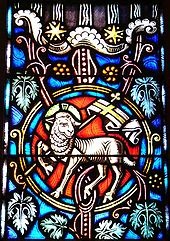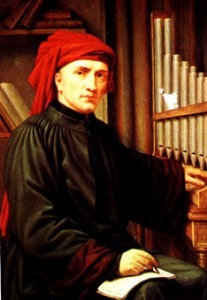 In the late 7th century, a chant associated with the breaking of the community bread was added to the Ordinary of the Roman Mass. The name of this new chant “Agnus Dei” (Lamb of God) originates in the Gospel of John, where John the Baptist upon seeing Jesus exclaims, “Behold the Lamb of God who takes away the sin of the world.” The full text consists of three acclamations, each beginning with the words “Agnus Dei,” with the final statement concluding with the words “dona nobis pacem” (grant us peace.) This official text was frequently subjected to elaborations and additions, and numerous melodies emerged during the Middle Ages.
In the late 7th century, a chant associated with the breaking of the community bread was added to the Ordinary of the Roman Mass. The name of this new chant “Agnus Dei” (Lamb of God) originates in the Gospel of John, where John the Baptist upon seeing Jesus exclaims, “Behold the Lamb of God who takes away the sin of the world.” The full text consists of three acclamations, each beginning with the words “Agnus Dei,” with the final statement concluding with the words “dona nobis pacem” (grant us peace.) This official text was frequently subjected to elaborations and additions, and numerous melodies emerged during the Middle Ages.
Gregorian Chant: Mass for Easter Day, “Agnus Dei”
The words of the “Agnus Dei” sound the themes of sacrifice and of adoration. John Calvin wrote that “in his trial before Pilate and while at Herod’s Court Jesus could have argued for his innocence, but instead remained mostly quiet and submitted to Crucifixion in obedience to the Father, for he knew his role as the Lamb of God.” In Christian iconography, an “Agnus Dei” is a visual representation of Jesus as a lamb. A banner displaying a cross rests on the lamb’s shoulder, and is held by its right foreleg. Occasionally, the lamb is bleeding from the area of the heart, symbolizing that Jesus shed his blood to take away the sins of the world.
Josquin des Prez: Missa Hercules dux Ferrariae, “Agnus Dei”

Josquin des Prez
William Byrd: Mass a 4, “Agnus Dei”

William Byrd
Franz Joseph Haydn: Mass No. 11 in D minor, “Nelson Mass” – Agnus Dei: Agnus Dei, qui tollis peccata mundi
Agnus Dei: Dona nobis pacem
Beginning in the New Year, we will explore musical settings celebrating Mary, mother of Christ. Happy 2014!!!




